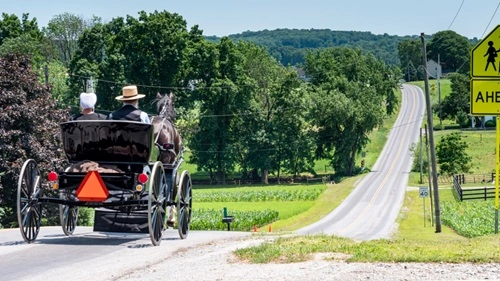Quakers and Amish are two distinct religious groups that originated from the broader Christian tradition. While both are rooted in Christianity and emphasize simple living, their beliefs, practices, and lifestyles differ significantly. These differences stem from their unique histories, interpretations of scripture, and approaches to interacting with the modern world.
This article explores the difference between Quakers and Amish, focusing on their origins, core beliefs, practices, and cultural lifestyles.
Who Are the Quakers?

The Quakers, formally known as the Religious Society of Friends, are a Christian denomination founded in the mid-17th century in England by George Fox. They emerged during a time of religious turmoil, seeking to restore simplicity and spirituality to Christianity.
Key Characteristics of Quakers:
- Core Belief: Quakers believe in the “Inner Light,” the idea that God’s presence exists within every individual. This leads to an emphasis on personal revelation and direct communication with God.
- Worship Style: Meetings are often silent, with individuals speaking only when they feel led by the Spirit.
- Simplicity: Quakers emphasize simple living, equality, and nonviolence.
- Social Activism: They are well-known for their involvement in social justice movements, including abolition, women’s rights, and pacifism.
- Modern Integration: Quakers generally embrace modern technology and education.
Types of Quakers:
- Unprogrammed Quakers: Focus on silent worship with no formal rituals.
- Programmed Quakers: Include pastors and structured services, similar to other Protestant denominations.
Who Are the Amish?
The Amish are a Christian group that originated in Switzerland in the late 17th century. They were founded by Jakob Ammann, a former Mennonite leader, who sought stricter adherence to biblical teachings and a separation from modern society.
Key Characteristics of the Amish:
- Core Belief: The Amish emphasize humility, obedience, and separation from the world, focusing on communal living and strict adherence to biblical teachings.
- Worship Style: Worship services are simple and held in homes or barns. They reject ornate church buildings and hierarchical structures.
- Simplicity: They practice extreme simplicity in clothing, lifestyle, and technology, avoiding modern conveniences like electricity and cars.
- Community-Oriented: The Amish prioritize community and family life, often living in close-knit rural communities.
- Rejection of Modernity: They limit the use of technology and modern conveniences, seeing them as distractions from their faith.
Amish Groups:
- Old Order Amish: The most traditional, rejecting most modern technologies.
- New Order Amish: Slightly more progressive, allowing limited use of technology.
- Beachy Amish: The most modern, permitting cars and some other conveniences.
Key Differences Between Quakers and Amish
| Aspect | Quakers | Amish |
|---|---|---|
| Origin | Founded in 17th-century England by George Fox. | Founded in 17th-century Switzerland by Jakob Ammann. |
| Core Belief | Focus on the “Inner Light” and personal connection with God. | Emphasize humility, obedience, and separation from the world. |
| Worship Style | Silent or semi-structured meetings, open to personal revelation. | Simple, community-based worship held in homes or barns. |
| Interaction with Technology | Embrace technology and modern conveniences. | Reject most modern technology, such as electricity and cars. |
| Lifestyle | Advocate for simple living but integrate with modern society. | Live in rural, self-sufficient communities with minimal external influence. |
| Clothing | No specific dress code; dress varies by personal choice. | Plain, homemade clothing with strict guidelines. |
| Social Activism | Actively involved in social justice causes. | Avoid political involvement or activism. |
| Education | Support formal education, often pursuing higher education. | Limit formal education, typically ending at eighth grade. |
| Community Structure | Individualistic, though community support is valued. | Highly communal, prioritizing collective well-being. |
1. Religious Beliefs
Quakers
- Quakers emphasize individual spirituality, believing that each person can directly experience God without the need for clergy or intermediaries.
- They reject sacraments like baptism and communion, viewing all aspects of life as sacred.
- The Quaker principle of nonviolence stems from their belief in equality and the inner light of God within everyone.
Amish
- The Amish follow a more literal interpretation of the Bible, emphasizing humility and obedience to God’s will.
- They practice adult baptism, believing it is a conscious commitment to their faith.
- Community values are central to their religion, and individuals are expected to conform to the rules of the community, known as the Ordnung (a set of unwritten rules governing behavior).
2. Worship Practices
Quakers
- Quaker meetings are often held in silence, with participants speaking only if they feel spiritually moved.
- There is no formal clergy or rituals, emphasizing equality among members.
- Programmed Quaker meetings may include hymns, readings, and sermons, resembling more traditional Protestant services.
Amish
- Amish worship services are held in members’ homes or barns and include hymns, scripture readings, and sermons.
- Services are lengthy and follow a structured format, often lasting several hours.
- They avoid church buildings and elaborate rituals to maintain simplicity.
3. Interaction with Modern Society
Quakers
- Quakers are fully integrated into modern society and are known for their social activism. They have played significant roles in movements for abolition, peace, and equality.
- They use modern technology, dress in contemporary clothing, and pursue higher education.
Amish
- The Amish maintain a strict separation from the modern world, avoiding electricity, automobiles, and modern conveniences.
- They dress in plain, traditional clothing to reflect humility and unity, rejecting trends or individuality.
- Education is limited to the basics, often stopping after the eighth grade, to prepare children for a life within the Amish community.
4. Lifestyle and Community
Quakers
- Quakers value simplicity but do not enforce specific lifestyle rules. They live in a wide variety of settings and professions.
- While community support is important, Quakers emphasize individual freedom and personal choices.
Amish
- Amish life revolves around the community and family. Decisions are made collectively, and members are expected to follow communal rules.
- They rely on farming, craftsmanship, and small businesses to maintain self-sufficiency.
5. Clothing
Quakers
- There is no specific dress code among Quakers. Historically, they favored plain dress, but modern Quakers typically wear standard contemporary clothing.
- Their focus is on avoiding excessive materialism rather than adhering to strict clothing rules.
Amish
- The Amish follow a strict dress code, wearing plain, homemade clothing. Men wear simple shirts, suspenders, and broad-brimmed hats, while women wear long dresses, aprons, and head coverings.
- Clothing reflects humility and uniformity, avoiding any display of wealth or vanity.
6. Education
Quakers
- Quakers value education and have historically founded schools and colleges. Many pursue higher education and careers in various fields.
- Their educational philosophy emphasizes critical thinking, social justice, and personal growth.
Amish
- Amish children attend school only until the eighth grade, focusing on practical skills needed for farming, homemaking, and community life.
- Higher education is discouraged, as it is seen as unnecessary for their way of life.
7. Social and Political Involvement
Quakers
- Quakers are actively involved in social and political issues, advocating for peace, human rights, and environmental sustainability.
- They have been prominent in movements like abolitionism, women’s suffrage, and climate change activism.
Amish
- The Amish avoid political involvement, focusing instead on their community and spiritual practices.
- They do not participate in military service or hold public office, aligning with their commitment to pacifism and separation from the world.
Conclusion
While both Quakers and Amish share Christian roots and a commitment to simplicity, their differences lie in their beliefs, practices, and interactions with modern society. Quakers embrace modernity and are actively engaged in social and political issues, emphasizing individual spirituality and equality. In contrast, the Amish live a secluded, community-focused life, adhering to strict traditions and rejecting modern technology.
Understanding the difference between Quakers and Amish highlights the diversity within Christianity and the ways different groups interpret and practice their faith. Both communities offer valuable insights into how simplicity, spirituality, and community can shape a way of life.



